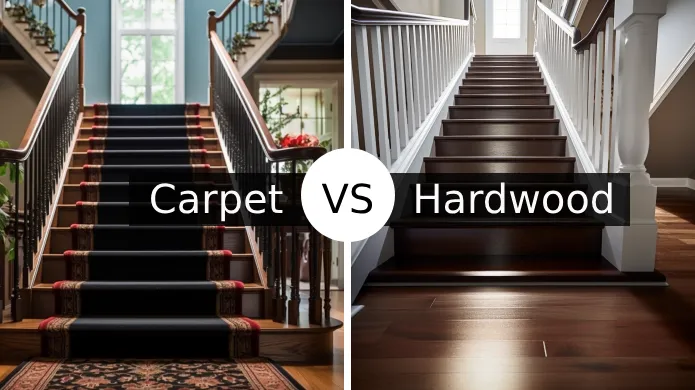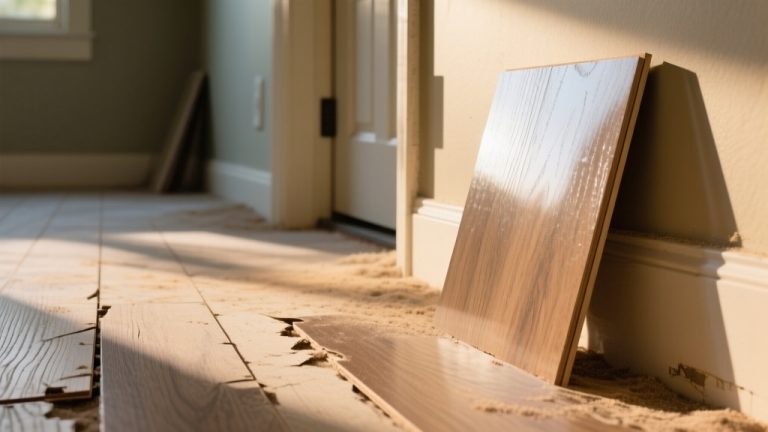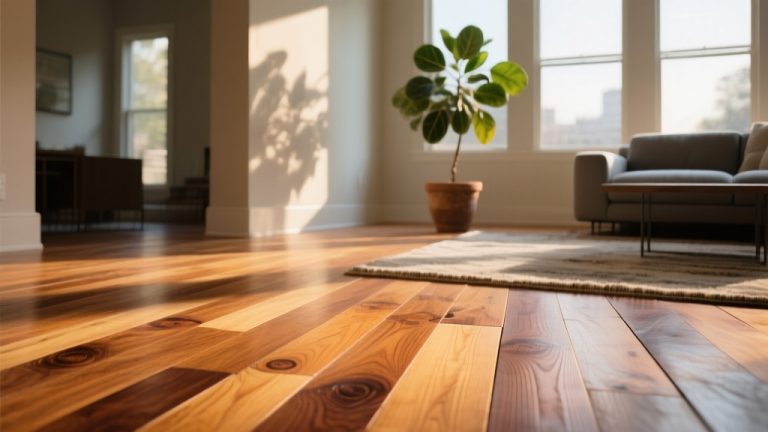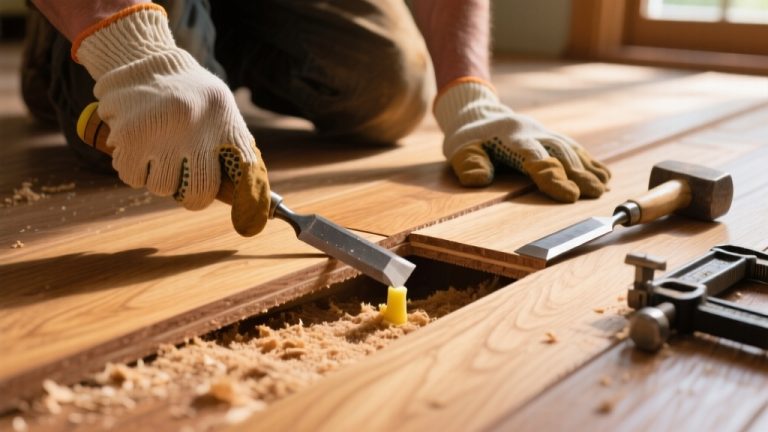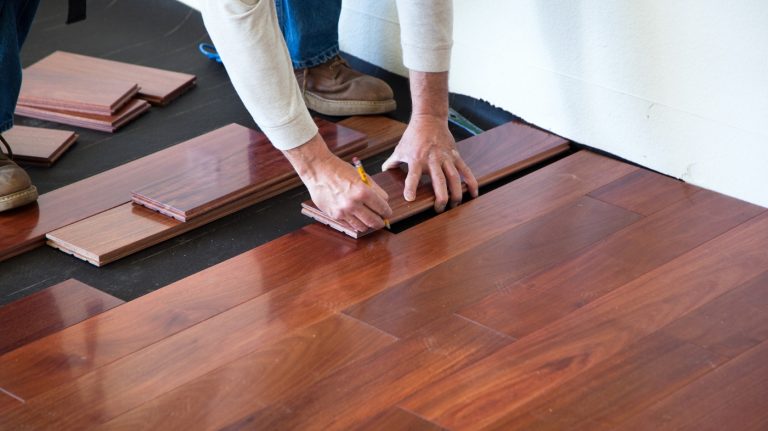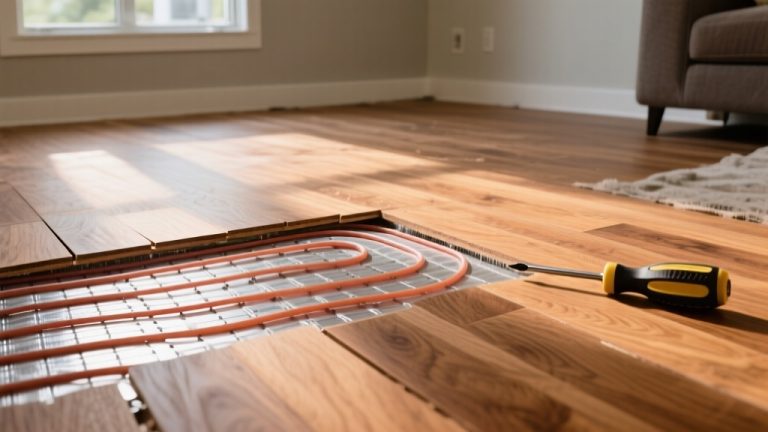Carpet Versus Hardwood on Stairs: 8 Differences
When renovating or building a house, one of the most significant decisions is the type of flooring for the stairs. Two common options are carpet and hardwood. While both materials have pros and cons, they significantly differ.
Carpeted stairs are safer, especially for kids and seniors, because they provide more friction and reduce slipping, while hardwood can be slippery and less safe than carpet. Also, carpets on stairs are prone to wearing out quickly, while hardwood is inherently more durable and can last for several decades.
Today we will explore the key differences between carpet versus hardwood on stairs, helping you make an informed choice. So keep reading to have a better idea of which flooring option is best for your home.
Carpet Versus Hardwood on Stairs: An In-Depth Comparison
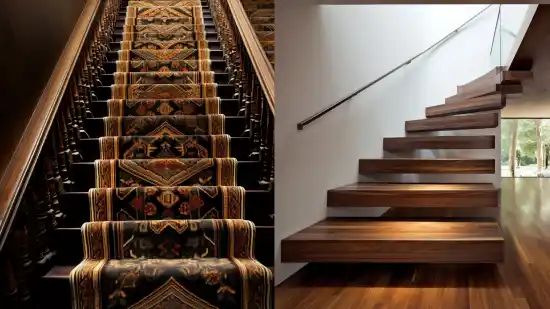
When choosing between carpet and hardwood for your stairs, there are several key differences to keep in mind.
- Aesthetics and lifestyle considerations
- Safety considerations
- Durability and reliability
- Cleaning and maintenance
- Noise reduction
- Comfortness
- Cost & installation
- Return on investment (ROI)
Let’s discuss the in detail:
1. Aesthetics and Lifestyle Considerations
Some people appreciate the soft and cozy appearance of carpeted stairs, hardwood stairs generally offer a more refined and modern look. However, hardwood-clad stairs are often favored for their sleek appearance, especially in homes with open riser staircases.
If your staircase is enclosed within a corridor, hardwood can make the space feel larger and more open. But if you want to achieve a minimalist look in your home, carpeted stairs would be a great choice.
2. Safety Considerations
Although studies have shown that both types of flooring can lead to falls, it is important to consider the safety implications when choosing your staircase.
When considering carpeted stairs, they are often perceived as safer due to the increased friction they provide, reducing the risk of slipping. This can be particularly beneficial for households with children and elderly individuals who may be more prone to accidents.
In contrast, hardwood stairs might be perceived as less safe due to their potentially slippery surface. It is possible to make these potentially slippery areas safer by using non-slip treads.
3. Durability and Reliability
Carpets on stairs tend to wear out relatively quickly, with a lifespan of around 7-10 years. High-traffic areas, such as staircases, can accelerate carpet wear.
Conversely, hardwood is inherently more durable than carpet and can last for several decades when properly maintained. Its longevity makes it a cost-effective choice in the long run.
4. Cleaning and Maintenance
The cleaning and maintenance requirements for carpeted and hardwood stairs differ due to their materials. Carpeted stairs accumulate more dust, dirt, and allergens, making regular vacuuming crucial. To maintain hygiene, deep cleaning with a carpet cleaner or professional service is also necessary
In contrast, hardwood stairs are easier to clean and maintain. Regular sweeping to remove loose dirt followed by mopping with a damp cloth or hardwood floor cleaner is sufficient to keep them clean. Hardwood stairs also do not harbor allergens like carpets do.
Here is a table summarizing the cleaning and maintenance requirements for both options:
| Carpeted Stairs | Hardwood Stairs | |
| Cleaning | Regular vacuuming, deep cleaning | Regular sweeping, occasional mopping |
| Maintenance | Potential need for replacement due to wear | Minimal maintenance required |
| and tear | ||
| Allergen | Accumulates dust, dirt, and allergens | Does not harbor allergens |
5. Noise Reduction
If you’re looking for a quieter living environment, considering the noise reduction benefits of carpeted stairs might be worth it. Here are some reasons why carpeted stairs can help reduce noise:
- Absorbs sound: The carpet naturally absorbs sound waves, which can help minimize noise transmission between floors.
- Softens footsteps: The cushioning effect of carpet can help muffle the sound of footsteps, making it ideal for households with children or pets.
- Reduces creaking: Hardwood stairs can develop creaking sounds over time, especially in high-traffic areas. Carpeted stairs can help minimize these noises.
But over time, hardwood stairs may develop creaking sounds, especially in high-traffic areas. This could be a concern for those who value a quieter environment.
6. Comfortness
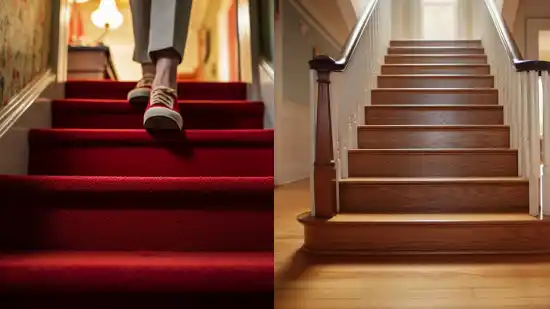
Walking on stairs with carpet can feel softer and more comfortable under your feet, providing a cozy and pleasant experience. The cushioning effect of the carpet absorbs the impact of each step, reducing strain on your joints and muscles.
In contrast, hardwood stairs are firmer and may feel less forgiving, especially if you walk on them frequently. The table below highlights the key differences between carpeted and hardwood stairs in terms of comfort:
| Carpeted Stairs | Hardwood Stairs | |
| Feel | Soft and plush | Firm and solid |
| Impact absorption | High | Low |
| Coziness | High | Low |
| Barefoot comfort | Excellent | Fair |
7. Cost & Installation
Generally hardwood stairs are more expensive, and installation can be challenging. But you may benefit from professional installation. The installation cost for carpeted stairs is low and may not require professional help.
When considering the cost and installation of carpeted stairs versus hardwood stairs, it is important to weigh the following factors:
- Material Cost: Carpeted stairs tend to be more affordable upfront, as carpeting costs are generally lower than hardwood materials.
- Labor Cost: Installing carpet on stairs can be complex, requiring precise measurements and cutting. Hiring a professional installer can ensure a smooth and proper installation, but it may come with an additional cost.
- Maintenance Cost: Hardwood stairs are generally easier to clean and maintain compared to carpeted stairs, which require regular vacuuming and occasional deep cleaning.
8. Return on Investment (ROI
When deciding between carpeted and hardwood stairs, it’s important to consider the return on investment. Hardwood stairs provide a higher return on investment compared to carpeted stairs.
Homebuyers often favor hardwood stairs for their aesthetic appeal and durability, which can contribute to a higher resale value. Also, well-maintained hardwood stairs can enhance the overall value of your home.
Meanwhile, while carpeting is not inherently bad, industry trends suggest that new homeowners prefer hardwood flooring. Low-pile carpeting is recommended if you choose to carpet your stairs.
Is it better to carpet or hardwood floors on stairs?
The use of hardwood surfaces in your home can easily lead to a fall if you have children or elderly family members. So consider the benefits of carpeting or using hardwood floors on your stairs. Here are some factors to consider when deciding between the two options:
- Safety: Carpeting provides a softer landing spot in case of a fall, reducing the likelihood of injury, especially for children and the elderly.
- Slippery Surfaces: Hardwood floors can be slippery, increasing the risk of accidents. Carpeting offers better traction and stability, making it safer to use stairs.
- Comfort: Carpeting adds a layer of cushioning, making the stairs more comfortable to walk on, especially for those with joint or foot pain.
Why do people prefer carpet over hardwood?
People prefer carpet because it provides a softer and more comfortable surface. Unlike hardwood, carpeting on stairs offers a cushioned feel underfoot, which can be particularly desirable in high-traffic areas like staircases.
This added comfort can make ascending and descending the stairs a more pleasant experience, reducing the impact on your joints. Also, carpeting on stairs can help prevent slips and falls, as the soft texture provides more traction than a smooth hardwood surface.
What color stair carpet is best for resale?
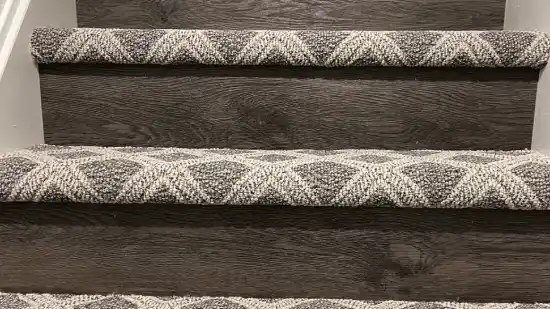
When choosing the color of a stair carpet for resale, there are a few factors to consider. You want to create a welcoming and inviting atmosphere for potential buyers.
So, neutral colors are the safest bet as they appeal to a wide range of tastes and are less likely to clash with other decor. Warm gray, tan, beige, or taupe are all great options that can create a sense of warmth and sophistication.
Also, lighter shades can make the space look more open and bright. However, it’s important to strike a balance and avoid overly bright colors that may raise concerns about maintenance and cleanliness.
Should expensive wood stairs be carpeted?
If you have expensive hardwood stairs, it’s best to avoid installing carpet on them to preserve their appearance. Carpeting can hide the natural beauty of the wood and potentially damage its surface.
Tacks and nail holes used to secure the carpet can leave permanent marks on the treads, making it difficult to refinish and stain the stairs in the future. Also, carpeting on stairs can accumulate dirt, dust, and pet hair, requiring frequent cleaning and maintenance.
Does replacing carpet with hardwood stairs increase the value of the home?
To increase the value of your home, consider replacing the carpet on your stairs with hardwood. Hardwood stairs not only bring a touch of elegance to your home but also provide several benefits that can boost its overall worth.
Here are four reasons why switching to hardwood stairs is a smart investment:
- Enhanced aesthetic appeal: Hardwood stairs instantly elevate the look and feel of your home, giving it a timeless and sophisticated charm.
- Increased durability: Unlike carpet, hardwood stairs are highly durable and resistant to wear and tear, ensuring they will maintain their beauty and value for years.
- Improved ease of maintenance: Hardwood stairs are much easier to clean and maintain than carpet, saving you time and effort in the long run.
- Higher resale value: Potential buyers appreciate hardwood stairs’ added value and allure, making your home more desirable on the real estate market.
Carpet or Hardwood: Choose the Proper One to Enhance Your Stairway Experience
Deciding between carpet and hardwood stairs must consider several factors, including aesthetics and lifestyle considerations, safety, durability, cleaning and maintenance, noise reduction, comfort, cost, installation, and return on investment.
Each material’s benefits and drawbacks will vary according to each household’s unique needs. While some may prefer the warmth and comfort of carpet, others may opt for the timeless elegance of hardwood.
Whichever path you choose, remember that the stairs are the gateway to your home and deserve to be treated with care and consideration. So make your stairs a true reflection of your unique taste and personality.

